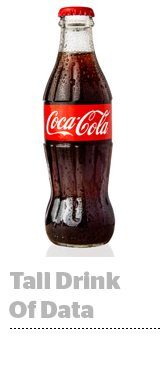The Coca-Cola Of Accounts
WPP won the pitch of the year: Coca-Cola’s media, creative and data agency business. The new account is “unparalleled in our industry in terms of breadth and depth of capabilities,” said WPP CEO Mark Read in a release. The fusion of creative, media and mar tech is indicative of a trend in Agency Land, where the holding companies have kludged together Mad Men-era creative brands with data-savvy agencies. For example, WPP merged Young & Rubicam with the digital agency VML into VMLY&R, and J. Walter Thompson was folded into Wunderman. The other finalist for Coke’s biz was Publicis Groupe, which is dueling WPP in its bid to be the world’s largest agency company. The Publicis creative shop Leo Burnett will remain on Coke’s agency roster, and Dentsu will also be an agency partner in select regions (it’s an incumbent in Japan and east Asian markets), as will Spanish-language IPG agency McCann Mercado. That may seem like a lot of runner-up prizes, but this is evidence of Coke slimming down. The brand previously worked with more than 4,000 agencies, so partnering with a small handful represents major consolidation. WPP also created an internal Coca-Cola agency called OpenX – apparently unaware of the SSP of the same name.
Reeling And Dealing
Instagram stepped up its cash bonus offers for influencers to post Reels – its wannabe-TikTok short video format. The company has a maximum payout of $35,000 per month pegged to video views, Insider reports. The payout formula is a black box – some creators get more than others for reaching lower engagement thresholds, perhaps based on their number of followers, the kind of content they create or, in some, even their TikTok following. Creators need to rack up millions of views to qualify for the Insta-checks, so it’s not exactly low-hanging fruit. Snapchat’s creator program took flak in the past because it had a similar lottery-inspired black box payout. YouTube’s more straightforward ad revenue share and sponsored content approach makes it easier for creators to build legit businesses because there are consistent, forecastable earnings. “When I saw that I need to reach a collective of 9.28 million views in about 30 days … my initial reaction is, I’m not going to make that,” said Jera Foster-Ferrell, a lifestyle content creator with 180,000 followers on Instagram and 1.3 million on TikTok. (She posted that on TikTok, natch). But Foster-Ferrel isn’t saying no. The bonus “definitely gives me an incentive to try,” she posted.
Programmatic Death Sites
One perverse and popular new trend from the gutter of the web is to scrape funeral home sites and local papers for obituaries or social media posts by friends and family of recently deceased people to create article pages – and, god help us, hoover up programmatic budgets, Morning Brew reports. These sites baaaaarely pass muster with ad networks and platforms like Google. They embed public posts and pull obits from sources with no byline – like funeral home sites – that don’t risk a plagiarism charge. (Google, for instance, wouldn’t allow such scraping of news sites.) These spammy sites also rely on unaware agencies and campaign managers or those who’ll abide a certain level of garbage in their media mix, so long as the overall ROI is positive. Unlike straight-up fraud sites, programmatic death sites get legit clicks, because people do search for someone’s name after their death to find out what happened. “It does bother me a little bit,” said Reid Caviston, who leads online marketing strategy for the Philly sports clothing company 2Fanz, after seeing his own retargeting ads on a programmatic death site. “At the same time, we’re profitable off of our ads, so I can’t complain too much.”
But Wait, There’s More!
Everything is an ad network. [Mobile Dev Memo]
Netflix will reportedly make games available via the App Store on iOS. [The Verge]
Twitch live-streamers say playing games is hard work. [WSJ]
How God-is Rivera helped put Black Twitter in front of marketers. [Digiday]
Fyllo, a startup that helps companies operating in highly regulated sectors, such as cannabis, with marketing and data compliance, has raised $40 million. [release]
You’re Hired!
Cognitiv taps Meredith Tehan as SVP of sales. [MarTech Series]












